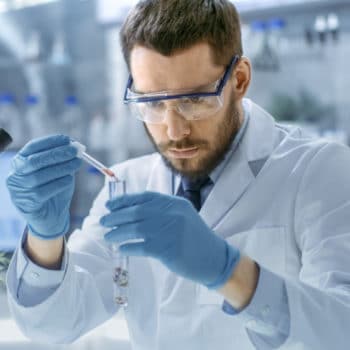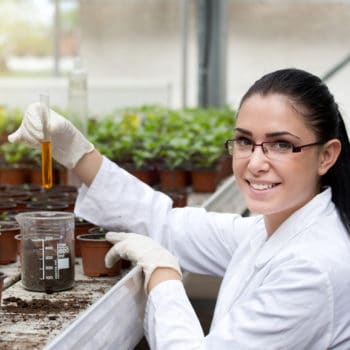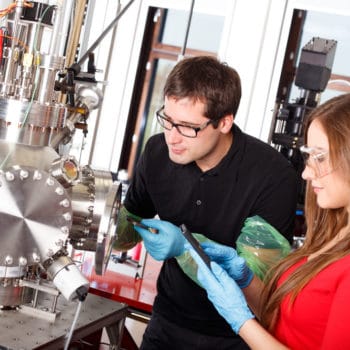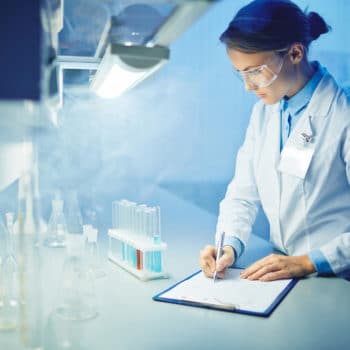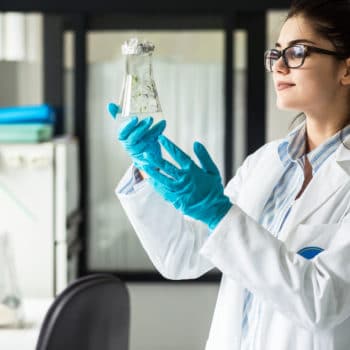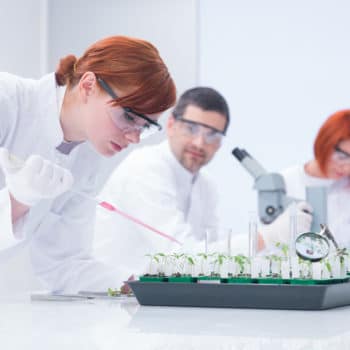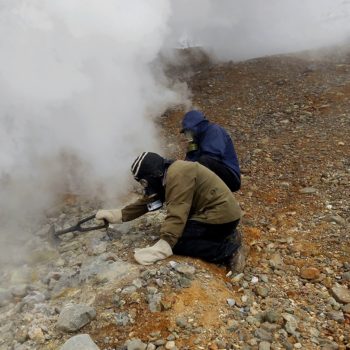Why We Love It
-
$77,860Potential Avg. Salary
-
2.6%Job Growth Rate
-
Growing DemandJob Outlook
-
InvestigativeCareer Attribute
Chemists study the ways that different chemicals and chemical materials interact with one another, and apply their learnings to develop new pharmaceutical drugs, plastics, cleaners, and other products and materials. They often work alongside scientists from other disciplines to form cross-functional teams.
Recommended Schools
What is a Chemist?
The following job responsibilities are common for individuals in chemist roles:
- Prepare testing equipment and materials like reagents, compounds, and solutions
- Use physical testing and computer modeling programs to determine how chemicals interact when combined
- Evaluate chemical reactions and resulting materials to determine potential usefulness
- Employ the expertise of other scientists to aid research and testing
- Teach other scientists and technicians how to safely handle, manage, and combine chemicals
A Day in the Life of a Chemist
Most chemists fill their days with one of two major responsibilities. Those who work in basic research conduct experiments and perform testing to learn more about chemicals, compounds, and reactions. Applied research chemists take the learnings produced or published by basic research chemists and apply those learnings to create useful, safe, and effective products. Chemists are responsible for creating many of the items we depend on from day to day, developing drugs, plastics, and cleaners.
Chemists rarely work in isolation. Instead, they commonly work with cross-functional teams of scientists from other disciplines. For example, those who work to develop new pharmaceutical drugs that cure diseases and illnesses typically work alongside biologists—biologists help chemists understand what effects drugs will have on the body and can anticipate any negative risks of new pharmaceuticals. Those who work to develop materials often do so alongside engineers who help form practical uses for results.
In addition to working with scientists from other disciplines, chemists also usually manage a team of technicians that aid with research and testing tasks. Chemists train these technicians how to perform testing and research, and how to safely manage, handle, and combine chemicals. They use a variety of tools to perform research and testing, preparing solutions, reagents, and compounds before testing begins, and often use computer modeling software to predict reactions and outcomes before testing.
Typical Work Schedule for Chemists
For the most part, chemists work full-time schedules during normal business hours. However, they may occasionally need to work overtime to oversee or complete time-sensitive experiments.
Typical Employers
Chemists may be employed to work for companies in a variety of industries, including research and development, pharmaceutical manufacturing, chemical manufacturing, government, and testing labs.
Recommended Schools
How To Become a Chemist
The educational path required for aspiring chemists depends on the type of tasks they want to perform in their roles. The starting point is earning a bachelor’s degree in chemistry or a related field. With a bachelor’s degree, chemists may be able to find entry-level work as technicians, assisting professional basic and applied research chemists with their testing and experimentation. For higher-level roles, a master’s degree is usually required, and a Ph.D. is necessary to conduct independent research.
However, simply having the right degrees does not guarantee aspiring chemists will be able to find work in the field. Having professional experience is important as well. For this reason, many aspiring chemists work as technicians while earning their graduate degrees. This allows them to gain ample experience in the field while also working to earn the degrees necessary for conducting independent research. With the right education and experience, chemists will become more competitive when applying for open roles.
Some chemists who are more interested in the practical application of chemistry may choose, alternatively, to pursue work as a chemical engineer. Chemical engineers are best served by earning bachelor’s and master’s degrees in chemical engineering because these programs focus on teaching students the basics and best practices of both chemistry and engineering concepts.
Chemist Salary Data
We’ve provided you the following to learn more about this career. The salary and growth data on this page comes from recently published Bureau of Labor Statistics data while the recommendations and editorial content are based on our research.
National Anual Salary
Low Range
$52,370Average
$77,860High Range
$125,450National Hourly Wage
Low Range
$25/hrAverage
$37/hrHigh Range
$60/hrHow do Chemist salaries stack up to other jobs across the country? Based on the latest jobs data nationwide, Chemist's can make an average annual salary of $77,860, or $37 per hour. On the lower end, they can make $52,370 or $25 per hour, perhaps when just starting out or based on the state you live in.
Salary Rankings And Facts
#150 Nationally for All Careers
Above Average Salary Nationally
Programs and Degrees
Here are the most common degrees for becoming a Chemist. a is usually recommended and specifically a degree or coursework that prepares you for the particular field, see below.
Highest Education Among Chemists
- 18.4% Doctorate
- 19.7% Masters
- 54.3% Bachelors
- 4.4% Associates
- 2.7% College
- 0.3% High School
- 0.1% Less than High School
Job Growth Projections and Forecast
2014 Total Jobs
91,1002024 Est. Jobs
93,500Job Growth Rate
2.6%Est. New Jobs
2,400How does Chemist job growth stack up to other jobs across the country? By 2024, there will be a change of 2,400 jobs for a total of 93,500 people employed in the career nationwide. This is a 2.6% change in growth over the next ten years, giving the career a growth rate nationwide of Above Average.
Growth Rankings And Facts
#530 Nationally for All Careers
Above Avg. Growth Nationally
What Companies Employ The Most Chemists
| Industry | Current Jobs | New Jobs Needed | % Increase |
|---|---|---|---|
| Research and development in the physical, engineering, and life sciences | 16,100 | 2,900 | 3% |
| Pharmaceutical and medicine manufacturing | 14,800 | -1,500 | -2% |
| Testing laboratories | 9,200 | 1,100 | 1% |




